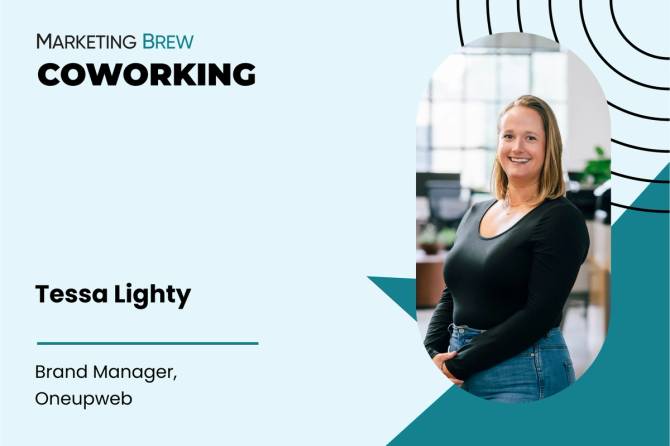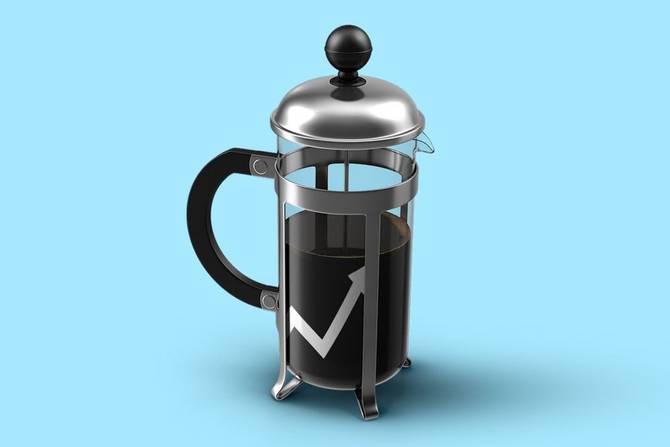It’s Tuesday. What’s black and white and red green all over? A seven-figure advertising deal between the New York Times and General Electric that gave GE all the advertising space in the Gray Lady’s pages today.
In today’s edition:
—Katie Hicks, Alyssa Meyers
|
|
The Office/NBC via Giphy
It’s the season of giving, and employees across America are gearing up to receive a gesture of thanks from their employer in the form of branded mugs and sweatshirts. But are they excited about it?
- According to a poll of Marketing Brew readers, about one-third of the more than 1,000 respondents said they keep their company’s branded merch and wear it publicly, one-third said they wear it only in private, and the final third was almost equally split between donating it and throwing it away.
-
Son Lam, marketing professor at the University of Georgia’s Terry College of Business, told Marketing Brew that how visible an employee wants their company swag to be (or if they want to wear it at all) often depends on how tied they are to the company. So it’s no surprise that those subjected to layoffs might make a quick trip to Goodwill.
Looking ahead: Even among current employees, the sheer volume of swag from events like recruiting camps and conferences can quickly add up, and eventually end up in a landfill halfway across the world once tossed. With people becoming more aware of their consumption habits, industry experts told us the corporate gifting world is starting to change as well.
Avoiding the trash
Leo Friedman, CEO and founder of promotional product supplier iPromo, told us that when the pandemic separated coworkers and clients, the “whole gifting industry blew up.” According to IBIS World, the promotional products industry in the US is worth more than $19 billion.
Friedman said there’s also been “a huge swing, tied toward [gifts] being eco-friendly and meaningful.” One current solution, he said, is “redemption stores,” in which employees can choose from a variety of products of the same value.
Click here to keep reading.—KH
|
|
|
Marketing and sales pros know how to juggle multiple projects, clients, and deadlines—and it’s a lot to manage. Wanna simplify your systems?
Organize your workflow with HubSpot’s free CRM platform that lets you sort deals comprehensively and track performance against quotas, all in one glorious space. Powerful, easy to use, and equipped with tools for sales, marketing, service, and ops pros, HubSpot’s CRM connects your customers and your biz, making growth more seamless and a joy for everyone.
Instead of cobbling together new and disjointed point solutions as you scale, HubSpot helps connect the dots between your teams and data without the added stress of managing and paying for multiple tools. Apply all that time you save using HubSpot to do what matters most: serve your customers.
Best of all, it’s free to get started. Grow better with HubSpot today.
|
|
Fotograzia/Getty Images
Podcast advertising often requires interpersonal interactions. Cue shudders from those who dread picking up the phone.
Programmatic capabilities exist in the industry, but brands that aren’t looking for bid-based buying might be faced with more manual processes. Until recently, that was the case for advertisers working with Acast, a global podcast company with about 88,000 podcasts in its marketplace.
A couple of months ago, Acast introduced a tool that enables advertisers—especially those that might not have massive budgets—to buy and run campaigns through a fully automated process, Product Manager Niklas Lagerberg explained to Marketing Brew.
The little guy: The self-serve platform, which has a minimum required spend of $250, was designed with small and mid-sized businesses and boutique agencies in mind, according to Lagerberg. His team also found that there’s demand for this kind of tool from podcasters looking to run ads promoting their own shows, he added.
Prior to the introduction of the tool, buyers who weren’t opting for programmatic had to use a lead-generation form to contact Acast, Lagerberg told us. But those with budgets that did not meet a minimum required spend were being turned away, “which led us down this path of trying to figure out who these buyers are and what kind of needs they have,” he said.
The minimum spend to work with a salesperson differs based on region, but in the US, anyone with a budget of $10,000 or lower is directed to the self-serve option.
How it works: Now, advertisers looking to place ads through the Acast marketplace without buying directly through a salesperson can qualify for the self-serve platform, which lets them upload preproduced ads, set campaign run dates, and target based on criteria like geographic location, age, gender, and podcast category, Lagerberg said.
Read the full story here.—AM
|
|
Tessa Lighty
Each Tuesday, we spotlight Marketing Brew readers in our Coworking series. If you’d like to be featured, introduce yourself here.
Tessa Lighty is brand manager at Oneupweb, a full-service digital marketing agency in Traverse City, Michigan.
Describe your career to date. My background is in journalism, specifically photojournalism. After hopping around the country working for various newspapers, I joined Oneupweb in 2019 as social media coordinator. My skills transferred well as a storyteller, and I quickly rose to my current role as brand manager.
Favorite project you’ve worked on? I created the Oneupweb Digital Digest, a weekly marketing newsletter that’s grown over the years. It’s been really rewarding to see that journey and monitor my actively engaged contacts each week.
What’s your favorite ad campaign? The Budweiser Clydesdales. Genius.
One thing we can’t guess from your LinkedIn profile? In 2021, I achieved my childhood dream of owning a horse.
What marketing trend are you most optimistic about? Least? I’m most excited about the growth of first-party data. In the few years I’ve been working in marketing, I have already seen so much growth and awareness from companies when it comes to creating positive experiences online.
I’m least excited about social media. In the past few years, all the platforms have changed and grown, and I’m feeling like we’re about to come to a head with mental health and how these major social media companies exploit people of all ages.
What’s one marketing-related podcast, social account, or series you’d recommend? Marketing-related is a pretty wide category, so I’ll go with Pew Research Center, particularly the internet and technology research.
|
|
TOGETHER WITH SPECTRUM REACH
|
|
Got FOMA? No, not fear of missing out—fear of missing audiences. In today’s increasingly diverse world, FOMA reigns supreme. Spectrum Reach helps you perfect market approaches and maximize your ad strategies so you can say goodbye to missed connections. Download the guide and go FOMA-free in 2023.
|
|
Francis Scialabba
There are a lot of bad marketing tips out there. These aren’t those.
At the register: Here’s how to optimize checkout pages online to reduce cart abandonment.
Group project: If you still don’t know what a LinkedIn pod is, check out this guide that reviews the basics—and whether it’s worth it.
Never stop posting: This publisher started posting memes on social media to see if it boosted site traffic—and documented the results.
|
|
-
Nike has officially terminated its partnership with Kyrie Irving, a month after it suspended its relationship with him after he shared antisemitic content and initially declined to apologize.
-
PepsiCo is laying off hundreds of workers in its snacks and beverage businesses at its North American HQ.
-
Facebook said it will “consider removing news” from its platform if a bill that would require platforms to compensate and negotiate with publishers for their content passes.
-
Hertz said it will pay $168 million to settle hundreds of claims from customers who allege they were “falsely accused of vehicle theft.”
-
Warner Bros. Discovery is expected to name its combined HBO Max and Discovery+ streaming service “Max,” CNBC reported.
|
|
Hershey’s, one of the world’s largest chocolate manufacturers and the maker of iconic candy brands like Reese’s and Kit Kat, is based out of which US state?
- Pennsylvania
- Indiana
- Michigan
- Kentucky
Keep scrolling for the answer.
|
|
Catch up on a few Marketing Brew stories you might have missed.
|
|
|
1. The chocolate brand has been based out of Pennsylvania, the home state of founder Milton Hershey, since its founding in the late 1800s.
|
|
|









